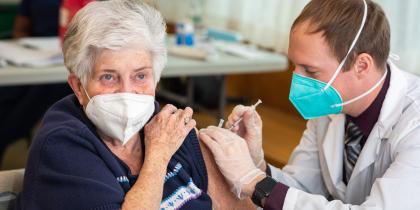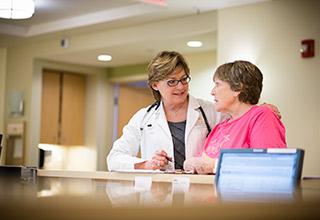What Vaccines Do Seniors Need?
The five vaccines that are important for maintaining good health as you age.

The Centers for Disease Control reports that each year, tens of thousands of people in the U.S. die from illnesses that could have been prevented by vaccines. The development of vaccines has proved to be one of the most successful public health advancements to come along in the history of medicine.
Before vaccines, many people became severely ill or died from infectious diseases such as smallpox, polio, diphtheria, measles, and pertussis. Since the widespread use of vaccines, smallpox has been eradicated worldwide and polio, measles, and rubella have been considered eliminated in the U.S., though there have been measles outbreaks in communities with low vaccination rates.
Clearly vaccines are important to our health as individuals, and in addition to providing self-protection, getting vaccinated is part of good citizenship. Vaccines empower all of us to reduce the spread of infectious disease within our families and circle of friends, as well as the community at large. Infants, older adults, and people with weakened immune systems (like those undergoing cancer treatment) are especially vulnerable to infectious diseases that are better controlled when everyone who can gets protected through vaccines.
As medical director of the Hebrew SeniorLife outpatient clinic at NewBridge on the Charles, one of my goals is helping seniors avoid health complications that can happen as we get older – and vaccines are an important tool.
Why are older adults at greater risk for vaccine-preventable illness?
Vaccinations remain essential to good health throughout life and are particularly important for older adults. With aging, the immune system weakens, and it can be more difficult to fight off infections. You’re more likely to get diseases like the flu, pneumonia, and shingles and to have complications that can lead to long-term illness, hospitalization, and even death.
If you have a chronic health condition like diabetes or heart disease, getting vaccinated is especially important. Vaccines can protect you from severe illness or related complications.
Five vaccines every older adult should get
With age, immunity from vaccinations you had as a child may have faded, and new vaccines are becoming available. I follow CDC recommendations when advising my patients. Here are their recommended immunizations for adults ages 65 and older:
- COVID-19 – The risk of severe illness from COVID-19 increases with age. Adults 65 and older are at the highest risk of getting severely ill from COVID-19 and represent 81% of COVID-19 deaths. Getting all recommended doses of a COVID-19 vaccine is an important step to help prevent hospitalization or death from the virus. The fall 2023 COVID-19 vaccines offered by Moderna and Pfizer are more than just boosters – they protect against new variants of the virus that are currently circulating widely and causing re-infections that can be serious for vulnerable individuals.
- Flu – An annual flu (influenza) shot is the best defense against the virus and the serious complications that it can cause. The best time to get vaccinated is in the early fall, before flu season starts. Flu and COVID-19 vaccines can be administered at the same time, although waiting one to two weeks between vaccines is reasonable if you have had significant vaccine side effects in the past.
- Shingles – In some people, the virus that causes chicken pox recurs years later as a painful skin rash – shingles (also known as zoster). Half of all cases occur in people age 60 and over. You can have shingles more than once, so even if you’ve had it, you should still get a shingles vaccine – known as Shingrix. The Shingrix vaccine is a series of two injections given two months apart, and should be given even if you had the much less effective original shingles vaccines (Zostavax) in the past.
- Pneumococcal – CDC recommends vaccination against pneumococcal pneumonia for all adults 65 and older. If you have never received a pneumonia vaccine, CDC recommends a one-time PCV20 (Prevnar20) vaccine. For adults who received an older pneumonia vaccine (primarily PCV13 and PPSV23), discuss with your doctor whether you should receive an additional vaccine. Having information on the type of pneumonia vaccination and date given can be helpful in making decisions about further vaccinations.
- Tdap – The Tdap vaccine protects against tetanus, diphtheria, and pertussis (whooping cough). Most people receive this vaccine when they’re young, but immunity fades over time. CDC recommends a booster shot every 10 years for all adults.
What About RSV?
CDC now recommends that adults 60 years of age and older may receive a single dose of respiratory syncytial virus vaccine using shared clinical decision-making. This means that you and your doctor can best decide when you should receive this new vaccine. Currently, I am recommending that most of our residents focus on keeping up to date with the flu and COVID-19 vaccines, as well as making sure they are up to date with the vaccines for shingles and pneumococcal pneumonia. However, for those older adults at higher risk of severe disease from RSV, it is prudent to get the RSV vaccine once the upcoming round of flu and COVID-19 vaccinations are complete. I recommend waiting two weeks after your last vaccination before obtaining the RSV vaccine. High-risk individuals include those with diabetes, heart, lung, liver, or kidney disease, and adults of advanced age or advanced disease with “frailty,” defined as unintentional weight loss of more than 10 lbs, general weakness, and low physical activity. RSV vaccination recommendations may change in the coming months as we gain more experience with this vaccine.
Your Medicare benefits include an annual wellness exam at which many aspects of health maintenance are reviewed. This is a good opportunity to bring in information you may have on prior vaccinations, and to discuss with your doctor or nurse practitioner what further vaccinations may be indicated.
Vaccine hesitancy – still not convinced?
Despite the preponderance of evidence that vaccines improve health outcomes for older adults, vaccine hesitancy remains an issue. CDC tracking data shows that combined vaccination rates against preventable diseases that particularly impact older adults remain lower than health care providers would like to see. And I agree with CDC’s position that “substantial improvement in adult vaccination uptake is needed to reduce the burden of vaccine-preventable diseases. Increasing the proportion of adults who receive recommended age-appropriate vaccines and assuring equitable access to and uptake of recommended vaccines is a high-priority public health issue.”
Although decisions around health care are rightfully personal, I urge all of my patients to ask questions and examine the evidence when making choices around whether or not vaccines are right for them. Open and honest communication with professional health care providers is key to determining the best vaccine regimen for you to keep you and those close to you healthy and safe.
Harvard Medical School-affiliated health care for seniors
At Hebrew SeniorLife, we offer top-quality geriatric care provided by geriatricians affiliated with Harvard Medical School. Our continuum of care includes outpatient primary care practices for residents at NewBridge on the Charles in Dedham and Orchard Cove in Canton, inpatient post-acute rehabilitation and long-term chronic care at Hebrew Rehabilitation Center, and community-based hospice. At each step of the journey, our clinical team provides highly individualized care focused on what matters most to our patients and their families. Learn more about Hebrew SeniorLife’s health care services or contact us today.
Blog Topics
Learn More
The Best Health Care for Seniors
Hebrew SeniorLife is the only senior health care organization affiliated with Harvard Medical School. Members of our caregiving teams specialize in providing geriatric care, and they do so with care and compassion.





